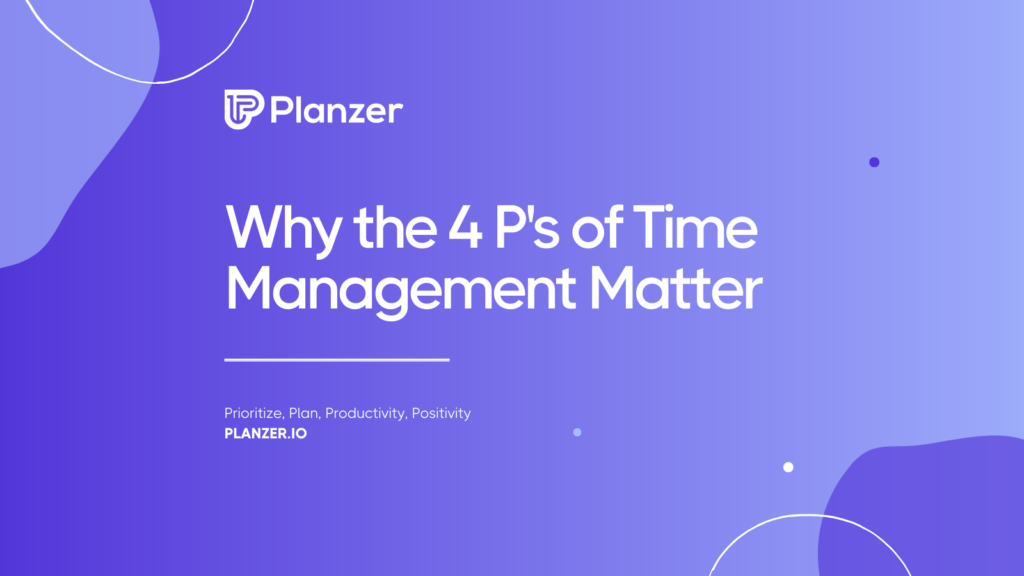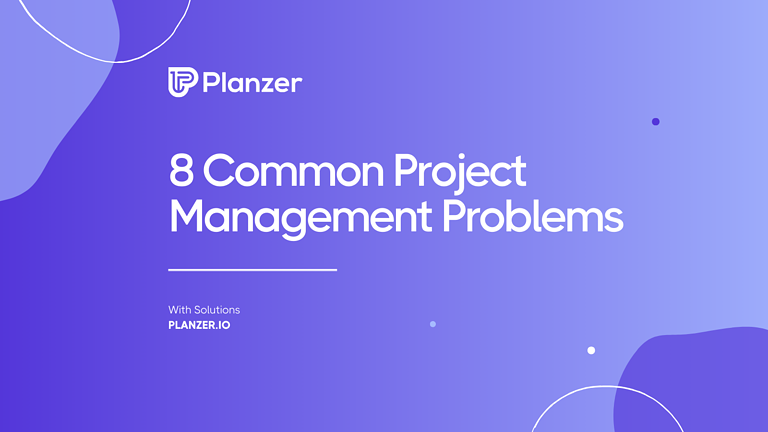Managing time can seem like a daunting task, particularly in this fast-paced world where we are constantly bombarded with distractions. However, with the right tools and techniques, you can take control of your time and make the most of every second.
That’s where the 4 P’s of Time Management come in. In this blog, we’ll go over the basics of time management before delving into the 4 P’s: Prioritising, Planning, Productivity, and Positivity. We’ll explain each of these concepts in detail, analysing why they are essential and how they can be applied to your life. Ultimately, we’ll reveal the benefits of incorporating the 4 P’s into your daily routine and explain why they are so crucial to achieving success and fulfilment.
The Basics of Time Management

Time management is a process of managing time efficiently and effectively to complete tasks on priority. It is one of the essential skills that everyone should have. It reduces stress, increases productivity, and makes more time for what you want to do.
Time management systems come in various formats, including time clocks, web-based applications, and project management tools, each catering to specific needs. Practical time management skills also involve attention management, time blocking, and organizational time management.
Practising good time management skills means you can prioritize tasks, reduce distractions, and manage your overall workload effectively. It provides a sense of control, helps avoid burnout, and promotes a healthy work-life balance.
Learning and practising the 4 P’s of time management can help you achieve your goals and make the most of your time and energy. These include prioritization, planning, process improvement, and being proactive. Understanding the basics of time management can help you develop the skills necessary for achieving success in both your personal and professional life.
What are the 4 P’s of Time Management?
Time management is essential for individuals who want to achieve long-term success. The 4 P’s of time management – planning, prioritizing, pushing, and partying – are four essential techniques that people can use to manage their time more effectively. Planning involves setting goals, identifying tasks, and planning time to work on them.
Prioritizing requires individuals to determine which tasks are the most important and allocate their time accordingly. Pushing means completing tasks that have been started and avoiding procrastination. Partying involves allocating time for recreational activities and self-care. By mastering the 4 P’s of time management, individuals can enhance their productivity and achieve tremendous success.
Prioritizing
The 4 P’s of time management are a strategy to help individuals prioritize tasks based on their importance and urgency. Prioritizing tasks allows project managers to complete essential tasks while leaving time for other activities.
The 4 P’s of time management categorize tasks into four groups: delete, delegate, defer, and do. The “delete” category involves saying “no” to non-vital tasks and focusing on core matters. The “delegate” category involves reassigning tasks that don’t require the specific know-how of the project manager.
Prioritizing tasks ultimately helps to ensure that the most critical tasks are completed first and that the remaining tasks are completed on schedule. This makes it easier for project managers to manage their time effectively and efficiently, leading to better overall productivity and higher-quality results.
Planning
The 4 P’s of time management refer to four strategies designed to help project managers prioritize tasks effectively. The first P stands for Planning, which encourages managers to organize their tasks carefully.
This includes creating a well-organized schedule, breaking down large projects into smaller tasks, and setting goals for each task. In addition to Planning, the 4 P’s include Deleting, Delegating, and Deferring tasks. By using the 4 P’s of time management, project managers can manage their time more efficiently and effectively.
Related concepts to time management include project management, attention management, time blocking, and organizational time management.
Productivity

The 4 P’s of Time Management are a popular framework for managing tasks and activities in relation to time. The P’s stand for:
– Prioritization: organizing tasks into categories based on importance and urgency
– Planning: creating a plan of action for completing tasks
– Productivity: utilizing time effectively and efficiently to accomplish tasks
– Procrastination: identifying and avoiding behaviours that waste time or delay the completion of tasks.
Productivity in terms of time management refers to the ability to effectively manage and utilize one’s time to accomplish tasks and achieve goals. By prioritizing tasks and creating a plan of action, individuals can increase productivity and achieve more in less time. A time management system can further automate processes, eliminating paperwork and tedious tasks and streamlining workflows for even greater productivity.
Positivity
The 4 P’s of Time Management refer to prioritization, planning, process, and positivity. While the first three are fairly self-explanatory, the fourth – positivity – is often overlooked. However, positive thinking can have a significant impact on your time management skills.
One popular time management method that emphasizes positivity is the Pomodoro Technique. This method involves working in shorter, 25-minute intervals and then taking a five-minute break. Many performance management software programs now include a Pomodoro timer to help users manage their time more effectively.
Taking regular breaks can help to keep you refreshed and motivated, allowing you to focus on your tasks. Positive thinking can also help you identify tasks that are important and urgent, making it easier to manage your time effectively. By incorporating positivity into your time management approach, you can improve your efficiency and productivity, allowing you to achieve your goals more effectively.
Benefits of Following the 4 P’s
Following the 4 P’s of time management can have significant benefits for individuals. Prioritizing tasks enables individuals to reduce stress and have more free time for personal pursuits.
The 4 P’s time management technique can assist individuals in achieving their goals and objectives in a shorter amount of time.
The 4 D’s of the Time Management technique is a helpful tool for product managers to remove clutter work and delegate tasks to others when necessary, allowing for greater efficiency.
Additionally, time management skills are desirable in the workplace as employers value an individual’s ability to prioritize and schedule work. Learning to say “no” and filtering out non-vital tasks can help make room for more critical activities, reinforcing the importance of the 4 P’s of time management.
Conclusion
Time management is crucial to maintaining a healthy work-life balance. It’s essential to set realistic goals, understand the priorities, and work towards achieving them systematically.
The 4 P’s of time management, namely prioritizing, planning, productivity, and positivity, help you achieve these goals. By prioritizing, you focus on what’s most important. Through planning, you can allocate the necessary resources to achieve specific objectives.
Productivity helps you accomplish more in a shorter amount of time. Positivity ensures that you stay motivated throughout the process. By following the 4 P’s, you can accomplish more without feeling overwhelmed or stressed.
Adopt these techniques for effective time management, and enjoy the long-term benefits in all areas of your life. Want to learn more about time management techniques? Check out our free downloadable guide on mastering time management techniques.
FAQ
How can prioritization help me manage my time more effectively?
Prioritization can help you manage your time more effectively by allowing you to focus on essential tasks and minimizing distractions.
By identifying which tasks are most crucial and assigning them a higher priority, you can ensure that you are making the most of your time and achieving your goals more efficiently.
Additionally, prioritization can help you avoid procrastination and reduce stress by breaking down larger tasks into smaller, more manageable ones. Overall, prioritization is a valuable tool for improving productivity and achieving success in both personal and professional contexts.
How can planning ahead save time in the long run?
Planning ahead can save time in the long run because it allows you to anticipate potential roadblocks and take action to prevent them. By planning ahead, you can create a schedule or to-do list that helps you prioritize tasks and use your time more efficiently.
This also allows you to make progress towards your goals in a more organized and less stressful manner, reducing the likelihood of mistakes and last-minute rushes. Ultimately, taking the time to plan ahead can save you time, increase productivity, and lead to better outcomes in the long run.
How can I balance productivity with taking breaks and time for self-care?
Balancing productivity with taking breaks and time for self-care can be challenging, but it is essential for maintaining a healthy work-life balance.
One strategy is to break up your workday into manageable chunks and schedule regular breaks throughout the day. During these breaks, you can take a few minutes to stretch or meditate or step away from your work altogether and engage in an activity that you enjoy.
It’s also important to prioritize self-care activities, such as exercise, hobbies, or spending time with loved ones, and schedule these into your daily routine. By finding a balance that works for you, you can optimize your productivity while also taking care of your mental and emotional well-being.



![Task Management vs Project Management [Ultimate Guide]](https://planzer.io/wp-content/uploads/2023/06/Task-Management-vs-Project-Management-Ultimate-Guide-768x432.png)